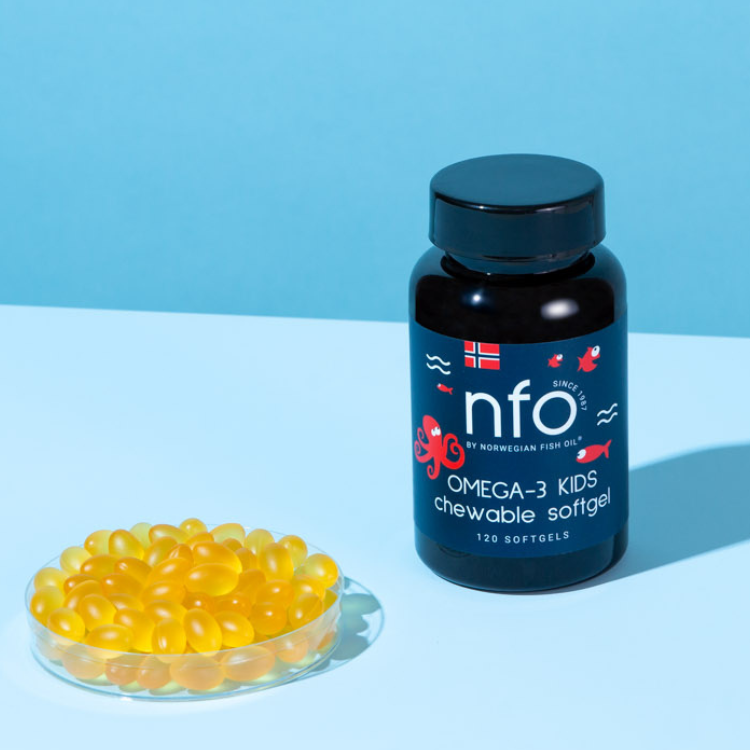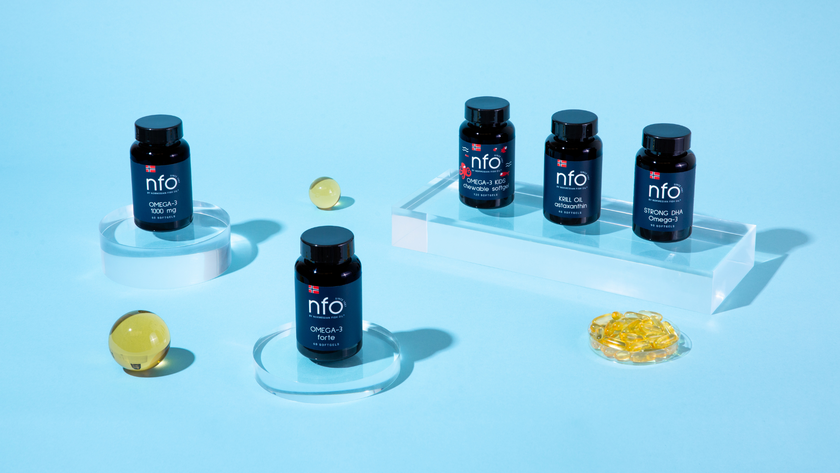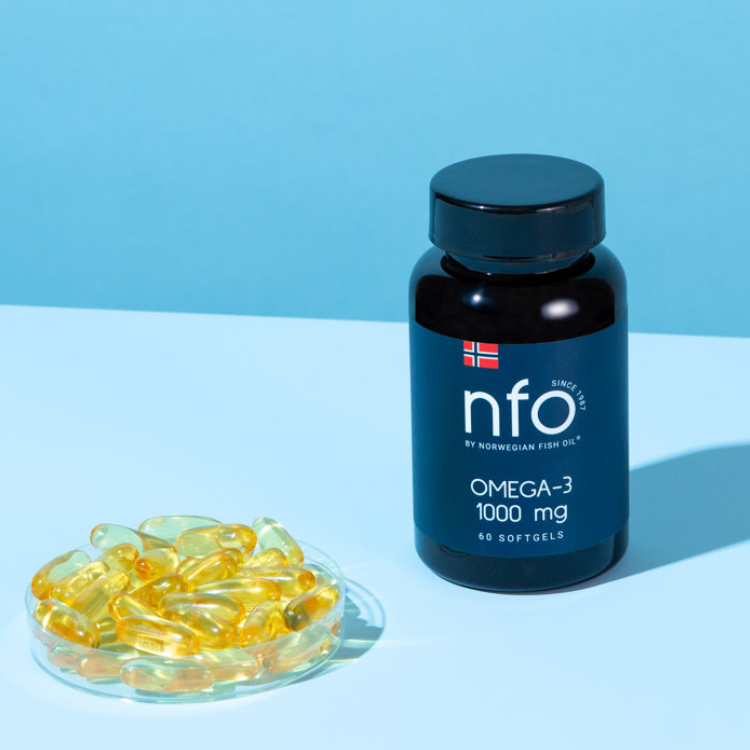1. أحماض أوميغا 3 الدهنية
أحماض أوميغا 3 الدهنية، وخاصةً حمض إيكوسابنتاينويك (EPA) وحمض دوكوساهيكسانويك (DHA)، ضرورية لصحة الدماغ. يُعدّ حمض DHA مكونًا هيكليًا أساسيًا للدماغ، بينما يُقدّم حمض إيكوسابنتاينويك فوائد مضادة للالتهابات تحمي أنسجة الدماغ.
- الفوائد: يُحسّن الذاكرة والأداء الإدراكي (ستونهاوس وآخرون، ٢٠١٣). يُخفّف أعراض الاكتئاب والقلق (لياو وآخرون، ٢٠١٩؛ سو وآخرون، ٢٠١٨).
- المصادر: توجد أحماض أوميجا 3 في الأسماك الدهنية مثل السلمون والماكريل والسردين، وكذلك في المكملات الغذائية مثل زيت السمك وزيت الطحالب للنباتيين.
2. فيتامين د
فيتامين د ضروري لنمو الدماغ ووظائفه. وقد ارتبط نقصه باضطرابات المزاج، والتدهور المعرفي، وضبابية الدماغ.
- الفوائد: يُحسّن المزاج ويُقلّل أعراض الاكتئاب (تشنغ وآخرون، ٢٠٢٠؛ فيليكات ومينون، ٢٠١٩). يدعم الصحة الإدراكية لدى كبار السن (كاسل وآخرون، ٢٠١٩؛ سيولين وآخرون، ٢٠٢٠).
- المصادر: تشمل المصادر الطبيعية ضوء الشمس، والأطعمة المدعمة، والمكملات الغذائية. يُعد فيتامين د3 فعالاً بشكل خاص في رفع مستوياته في الدم (هيلث لاين، ٢٠٢٠).
3. المغنيسيوم
يلعب المغنيسيوم دورًا حيويًا في صحة الدماغ من خلال تنظيم النواقل العصبية وتقليل أعراض التوتر. كما يدعم العمليات الإدراكية والتواصل العصبي.
- الفوائد: يُحسّن الذاكرة والوظائف الإدراكية (لو وآخرون، ٢٠١٩؛ رازاك، ٢٠١٨). يُخفّف أعراض القلق والاكتئاب (بيكرينج وآخرون، ٢٠٢٠؛ بوتوري وآخرون، ٢٠٢٠).
- المصادر: تشمل الأطعمة الغنية بالمغنيسيوم الخضراوات الورقية، والمكسرات، والبذور، والحبوب الكاملة. كما تتوفر مكملات المغنيسيوم، مثل سترات أو جليسينات المغنيسيوم، على نطاق واسع.
4. فيتامينات ب (ب6، ب9، ب12)
مجموعة فيتامينات ب ضرورية لاستقلاب الطاقة وصحة الدماغ. وتُعد فيتامينات ب6، وب9 (حمض الفوليك)، وب12 مهمة بشكل خاص للوظائف الإدراكية.
- الفوائد: يُقلل من التدهور المعرفي ويدعم الذاكرة (هيوز وآخرون، ٢٠١٧؛ نالدر وآخرون، ٢٠٢١). يُخفض مستويات الهوموسيستين، وهو مؤشر مرتبط بضعف الإدراك (آن وآخرون، ٢٠١٩؛ جاتوي وآخرون، ٢٠٢٠).
- المصادر: توجد فيتامينات ب في الخضراوات الورقية، والبقوليات، والبيض، والحبوب المدعمة. يمكن للمكملات الغذائية توفير جرعات محددة للأشخاص الذين يعانون من نقصها.
5. إل-ثيانين
L-theanine، وهو حمض أميني موجود في الشاي الأخضر، يعزز الاسترخاء دون التهدئة ويدعم الوظيفة الإدراكية.
- الفوائد: يُحسّن التركيز والانتباه والذاكرة (بابا وآخرون، ٢٠٢١؛ ديتز وآخرون، ٢٠١٧). يُقلّل التوتر ويُحسّن جودة النوم (كونوجي وآخرون، ٢٠١٩).
- المصادر: يعتبر الشاي الأخضر ومكملات L-theanine من الطرق الممتازة لإدراج هذا الحمض الأميني في نظامك الغذائي.
6. فيتامين سي
فيتامين سي هو أحد مضادات الأكسدة القوية التي تحمي الدماغ من الإجهاد التأكسدي وتدعم إنتاج الناقلات العصبية.
- الفوائد: يُحسّن المزاج والوظائف الإدراكية (بولار وآخرون، ٢٠١٨؛ ترافيكا وآخرون، ٢٠١٩). يُخفّف أعراض التوتر والإرهاق (يوساي وآخرون، ٢٠٢١).
- المصادر: توفر الحمضيات والفلفل الحلو والمكملات الغذائية الكمية الكافية من فيتامين سي لصحة الدماغ.
7. حمض الفوليك (فيتامين ب9)
يلعب حمض الفوليك دورًا مهمًا في تركيب الحمض النووي وإصلاحه، وكذلك في إنتاج النواقل العصبية.
- الفوائد: يدعم الذاكرة والصحة الإدراكية (نالدر وآخرون، ٢٠٢١). يُقلل أعراض الاكتئاب (آن وآخرون، ٢٠١٩).
- المصادر: تعتبر الخضروات الورقية الداكنة، والهليون، والحبوب المدعمة بحمض الفوليك مصادر ممتازة لهذا الفيتامين.
8. مستخلص الشاي الأخضر
مستخلص الشاي الأخضر، الغني بالبوليفينول مثل غالات الإبيجالوكيتشين (EGCG)، يدعم صحة الدماغ والمزاج.
- الفوائد: يُحسّن الذاكرة والتركيز (ديتز وآخرون، ٢٠١٧). يُخفّف أعراض الاكتئاب والقلق (ديتز وآخرون، ٢٠١٧).
- المصادر: يوفر الشاي الأخضر والمكملات الغذائية التي تحتوي على مستخلصات الشاي الأخضر القياسية فوائد مركزة.
9. البروبيوتيك
يُسلِّط محور الأمعاء والدماغ الضوء على التأثير الكبير لصحة الأمعاء على الوظيفة الإدراكية. يُمكن للبروبيوتيك تحسين ميكروبات الأمعاء، مما يدعم صحة الدماغ بشكل غير مباشر.
- الفوائد: يُحسّن المزاج ويُقلّل من ضبابية الدماغ (Djurovic وآخرون، ٢٠١٨؛ Knezevic وآخرون، ٢٠٢٠). يُحسّن الوظيفة الإدراكية والصحة النفسية (Lanza وآخرون، ٢٠١٨).
- المصادر: الأطعمة المخمرة مثل الزبادي والكفير ومكملات البروبيوتيك ممتازة للحفاظ على صحة الأمعاء.
10. الكركمين
الكركمين، المركب النشط في الكركم، معروف بخصائصه القوية المضادة للالتهابات ومضادات الأكسدة.
- الفوائد: يحمي من التدهور المعرفي ويُحسّن الذاكرة (ميديك وآخرون، ٢٠١٧). يُقلل الالتهابات المرتبطة بالأمراض العصبية التنكسية (ميديك وآخرون، ٢٠١٧).
- المصادر: توفر مكملات بهارات الكركم والكركمين هذا المركب القوي الذي يدعم الدماغ.
خاتمة
للمكملات الغذائية دورٌ هامٌ في دعم صحة الدماغ، خاصةً عند دمجها مع نمط حياة صحي. تُعنى العناصر الغذائية الأساسية، مثل أحماض أوميغا 3 الدهنية والمغنيسيوم وفيتامينات ب، بجوانب مختلفة من الوظائف الإدراكية، بدءًا من الذاكرة والتركيز وصولًا إلى تحسين المزاج والقدرة على مواجهة التوتر. وكما هو الحال دائمًا، من المهم استشارة مقدم الرعاية الصحية قبل البدء بأي نظام غذائي جديد للمكملات الغذائية لضمان سلامته وفعاليته.









